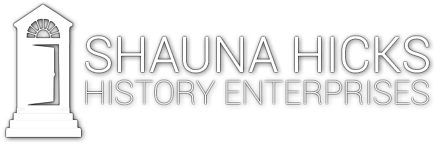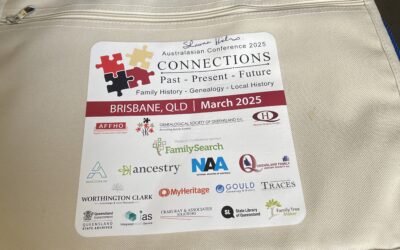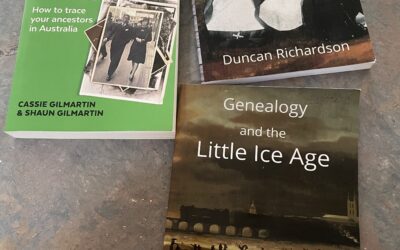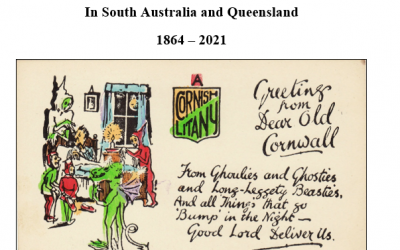On the recent Unlock the Past genealogy cruise, Thomas MacEntee chaired a panel session looking at the future of genealogy. The panellists were myself (Shauna Hicks from Queensland, Mike Murray from Western Australia, Chris Paton from Scotland and Kirsty Gray from England. Thomas had a set of six questions which he put to each panellist.
This session was of great interest to me so even though I was on the panel, I tried to make notes of what everyone was saying to write up this report.
Question One
What was the most amazing development in the field of genealogy and family history for 2013?
I was the closest panellist to Thomas so the microphone and the option to answer first always fell to me. That was OK because I had seen the questions earlier and had prepared some notes whereas Kirsty had not seen the questions before and needed a little time to think about her answers. My response was increased usage of technology with webinars, Google hangouts etc allowing active participation from anywhere in the world. Genealogy and family history societies should make more use of this type of technology if they want to retain/increase their memberships and attract younger members.
Mike mentioned the growth of online records and that it was almost too easy now. Chris mentioned archives and genealogy and the use of structured searching in archives catalogues. He gave SCAN (Scottish Archives Network) as an example. Kirsty pointed out that there was more social networking, blogging and that this could be very collaborative. They obviously all said a bit more than that but those are the points that I noted down.
Question Two
Is there a “typical genealogist?” How would you describe the demographic of the genealogy consumer industry in Australia? Outside of Australia?
My response was that there is no typical genealogist, it ranges from old timers like me to Ancestry newbies. Plus there is also the other divide which is those who belong to societies and those who are by themselves online and I thought that most were female and probably over 50 but we are seeing a few younger people. However I do not think societies are welcoming or meeting their needs so younger people are mostly online and using social media. The other mindset is that a lot of people want it all free or very cheap which is probably also a result of the aged demographic and reduced income dynamic.
Mike reported seeing more younger people in the west and suggested that it was because there are more IT options now to attract them. Chris agreed with me that there was no typical genealogist but they were probably over 50. He pointed out that membership of societies was shrinking and that most people now were doing their own research and only using professionals for problems or where they could not find something themselves. Kirsty said that in her areas (one name studies and one place studies) there were probably more men than women, people were interested in their own families and she did mention the word ‘eccentric’.
Question Three
Are there any setbacks or pushbacks you’ve seen over the past few years that are a cause for concern, especially when it comes to growth of the genealogy industry?
My response was that societies are finding it hard to retain memberships and to stay viable they increase their membership fees, without offering new services to all their members (those at a distance can not always get to a stepped up education program or whatever in person) and this in turn tends to lead to even more members not rejoining. Some societies are aging and not looking at, or are unsuccessful in recruiting newer committee members and I can see some societies even folding within a decade or so.
Mike mentioned the standardisation of BDMs across Australia and how that has meant that some records that were previously available in some states are now restricted and the proof of identity issues are a block to professional researchers. Chris highlighted that people forget that it is not all online and that you still need to look at the records, not just the indexes. He also mentioned declining society memberships and that crowd sourcing projects was a new way for societies to do big indexing projects. Kirsty commented that there are not as many volunteers now as many people are now busier tied to their mobile phones and other online demands.
Question Four
What role will media (television, print, online) continue to play in the genealogy field?
My response was that online will only continue to grow and societies who really embrace this will remain relevant. Print is slowly being replaced by ebooks etc but it still has a place due to the aged demographic at least for the next decade or so. Television is only really good for the big companies who can afford to advertise and it can give people a false impression on how easy and interesting family history can be.
Mike pointed out the big impact that WDYTYA has had on the interest in genealogy and that there was increased interest in DNA. He does not think much of social media and referred to it as ‘froth and bubble’ which I think annoyed some people in the audience as this cruise attracted quite a number of geneabloggers who are all into social media and how it can assist with your research and your genealogy business (if you have one). Chris agreed with the impact of WDYTYA and that it will continue to highlight genealogy until the next big thing comes along, and that the bubble will burst sometime. Kirsty said that WDYTYA had been phenomenal for societies in the UK but I am not sure that is the same for Australia.
Question Five
Five years from now, what will be the most popular method for the “newbies” to find genealogy and get hooked?
My response was probably online but I would also like to see archives and libraries still having a role – if people do not use them then chances are there will be staff cutbacks, reduced services etc. Although we often find after cutbacks more digitised resources available to all, not just those who can visit in person.
Mike said online also and that ‘apis’ would be used to tap into mass data from archives and libraries. Chris was totally honest and said ‘no bloody clue’ as the last five years had seen so much change but he did think that archives and libraries would be using more social media to reach their clients. Kirsty also said more social media networking for everyone and that it was a way for archives to advertise what they have for researchers.
Question Six
Over the next five years, what will be the biggest motivator or product or concept to propel genealogy forward?
Thomas was going to skip this question as it had been basically covered by the answers to the first five questions. However, this is where I wanted to promote NFHM so I was allowed to make my plea to those in the audience to support me as voluntary national coordinator. In Australia and New Zealand we have National Family History Month in August – it was a week from 2006 to 2012 but I increased it to a month in 2013 as a week is simply not long enough to get coverage across the country. I hope that NFHM will continue to grow and that should also be a central point for societies and other organisations to rally around and promote family history each year. They might even get some more members!
Questions from the Audience
The first question picked up on the fact that the panel was divided on the question of social media and its relevance so we were all asked about our own use of social media. I am a fan of Twitter but also use Google+ and Facebook and of course have two blogs, this one and Diary of an Australian Genealogist.
Mike confirmed that he did not use social media and that he felt it was more essential to get more family stories told and more apps developed. Chris pointed out there would be more interactive websites and gave the example of Scottish post office directories linked to maps. He uses Twitter and Facebook but is not into Google +. Kirsty said we would see more personal websites and that it was important to use technology to leave something behind. She uses Google + and Skype.
The next question was about crowd sourcing and Chris said it was always important to have a back up. Another question concerned archives to be more collaborative with genealogists and Chris said some already were but others were still to see the light.
Another question concerned the use of social media for campaigns and I mentioned the Australian Save the Census campaign of a few years ago before social media and that it would be easier to do that type of thing now. Chris said that it did need serious coordination between groups to be really successful. Mike pointed out again that he did not find social media useful or relevant. Kirsty gave the example of the 1911 census which was released early and that government organisations are interested in what users think.
The final question was about volunteers and how hard it was to get people to do projects or to sit on committees. Chris pointed out that some indexing projects are just duplicating what has already been done by some of the big companies and Kirsty said it was important to show committees that a project will work. Her One Place Studies is totally online and world wide. Mike mentioned that WA now has a members only section and that has increased interest in the society. Chris said some societies put their records online for free so that they could attract world wide attention.
Unfortunately I did not note my own answers to the questions but the panel was in agreement over most things with the exception of the value of social media for research and business. I hope I have not misquoted anyone and it was a pity that I could not note everything that was said (but I just can not write that fast).
So what is the future of genealogy? Well I do not think we are all going to lose interest anytime soon (I started in 1977 so now into my 37th year of researching my family). Technology is obviously a major player and we will continue to see more digitised records and mega databases. Social media is definitely a big player too and I have numerous examples where I have been contacted by distant family members who have found me via my blogs and stories written about my ancestors. Thanks to technology we can communicate cheaply and easily in person via Skype, Facebook, Google hangouts and email.
The responses from all of the panelists showed that there was not a great lot of difference between the various countries and technology and social media is bringing us all closer together. Thomas moderated the panel session expertly and I think everyone went away with a lot of thoughts going through their minds. I must make a note to revisit this blog post in five years time!!





Thanks for this excellent (and kind) summary, Shauna. The Panel sessions on the cruise that gave more thanone spruiker an opportunity have input were a highlight of the cruise for me.
Thanks Jill. I am sorry I missed your panel session on dealing with ethical dilemmas in genealogy. I would love to have attended but that was one morning I had to stay in the cabin! Has anyone written up a report on that yet?
Great write up Shauna, thanks!
Thanks Shauna for this and all your excellent reports. I have a lot of reports to catch up with after 3-1/2 weeks on the road, sea and air (with limited internet access) – and just picked this one up at Sydney airport while waiting to board my final flight back to Adelaide.
Great report Shauna, thank you for sharing it!
Thanks for the report Shauna. Interesting to look at different perspectives.
A great summary Shauna….I was sorry I hadn’t followed your example with the ethics panel but I don’t think there was as much divergence in our opinions. It’s hard to remember just how much has changed in the past 10 years – where will we be in 2024? I gave it a fair bit of thought afterwards, and while many will do the genealogy nuts and bolts, there will always be those who are hooked on the stories, and will use whatever medium gives them the opportunity to learn and reveal those stories.
Interesting! We’re hoping to be able to market to more Australians and help them with their genealogy brick walls. We research from the Family History Library in Utah and through agents elsewhere (including in Australia and New Zealand). http://legacytree.com
Great article. As one of the world’s largest family history research firms, we have been serving the needs of Australians and New Zealanders for many years. They are one of the best markets for family history research.